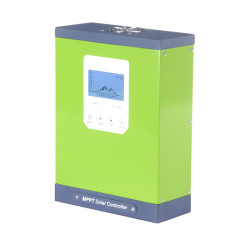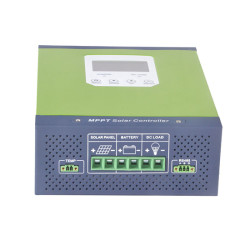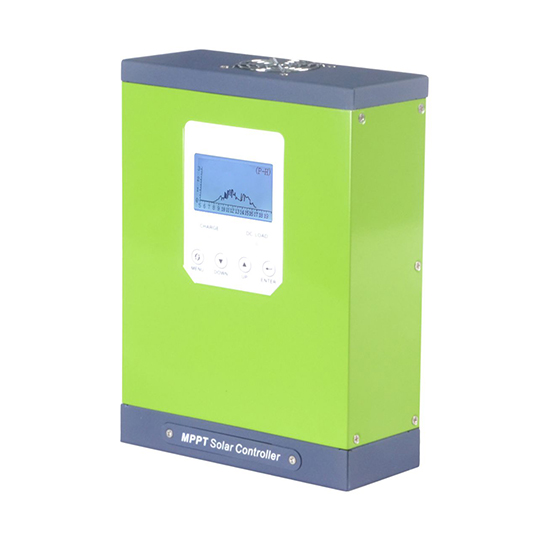
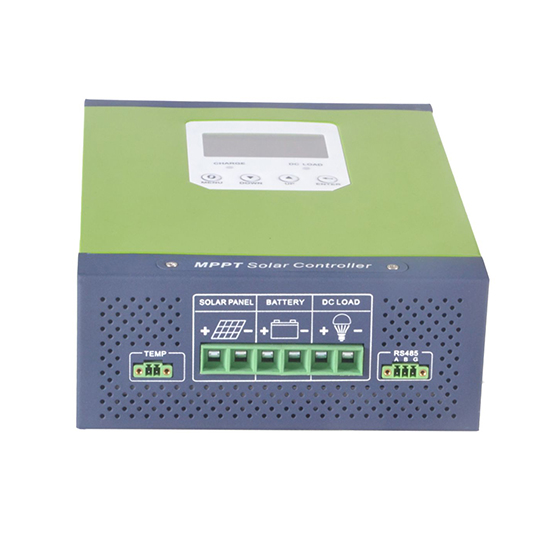
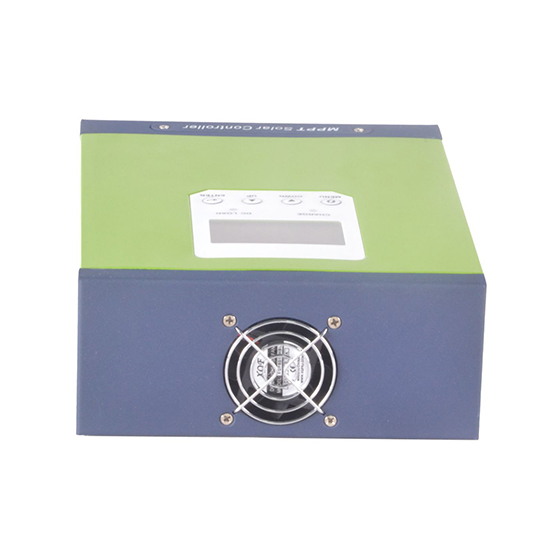



- Stock: In Stock
- Model: PEACO-TYC-30IR
- SKU: PEACO-TYC-30IR
Available Options
Solar charge controller (solar regulator) is essentially a solar battery charger connected between the solar panels and battery. MPPT solar controller can regulate the battery charging process to ensure the battery is charged correctly and not over-charged. Reliable 30A MPPT regulator can match with 12V-48V, 420W-1650W solar panels. Competitive price, free shipping.
Features
- Iron shell permits excellent heat dissipation, allowing natural cooling.
- The creative maximum power is tracking, can improve the solar system availability dramatically and maximum conversion rate is >98%.
- The tracking rate of maximum poweris ≥99%.
- With charging mode indicator and working mode indicator.
- English liquid crystal (LCD) display.
- The components used are all first-line brands, the high temperature resistance is not lower than 105℃, and the desian life is more than 10 years.
- Display real-time power generation and curve and fault record.
- Display daily power generation and cumulative power generation.
Specifications
| Model | PEACO-TYC-30IR | |
| Rated voltage | 12V / 24V / 48V Auto | |
| Rated current | 30A | |
| Maximum protection current | 32A | |
| Battery voltage identification range | 12V(DC 9V-DC 15V), 24V (DC 18V-DC 30V), 48V (DC 36V-60V), 96V (DC 72V-120V) | |
| MPPT operating voltage range | 12V(DC 18V-DC 150V), 24V (DC 34V-DC 150V), 48V (DC 65V-150V), 96V (DC 130V-180V) | |
| Maximum PV input power | 12V: 420W, 24V: 840W, 48V: 1650W | |
| PV input low voltage protection point | 12V: DC 16V, 24V: DC 30V, 48V: DC 60V, 96V: DC120V | |
| PV inout low pressure recovery point | 12V: DC 18V, 24V: DC 34V, 48V: DC 65V, 96V: DC130V | |
| Limit input voltage | DC 170V | |
| PV input overvoltage protection point | DC 175V | |
| PV input overvoltage recovery point | DC 170V | |
| charging method | 3 stage: constant currenet (MPPT), equalizing charge, float charge | |
| System type | 12/24/48V automatic identify, 48/96V automatic identify ( 36V, 72V manual setting) | |
| Static power consumption | 2W | |
| Machine efficiency | 96.50% | |
| PV module utilization | 99.97% | |
| Foat voltage | 12V(13.75V), 24V(27.5V), 48V(55V),96V(110V) (customized) | |
| Average charge voltage | 12V(14.2V), 24V(28.4V), 48V(56.8V), 96V(113.6V) (customized) | |
| Recommended PV module voltage | 12V(18V-60V), 24V(36V-72V), 48V(72V-144V), 96V(144V-180V) | |
| Temperature compensation | -3mVC/2V | |
| Temperature protection | 90℃ | |
| Temperature rise protection | 85℃ or more to reduce power output | |
| Protective function | PV array short circuit, overvoltage, overcurrent, reverse polarity protection, battery overcharge, reverse protection, under voltage protection. | |
| Working temperature | -10℃-+45℃ | |
| Humidity | 0-90%RH (Not condensation) | |
| Altitude | 0-3000m | |
| Security level | CE, PSE, FCC, EMC | |
| Mechanical protection class | IP21 | |
| Optional battery type | Lead-acid battery. colloidal batteries, liquid batteries,lithium batteries. (Also can be customized for other types of battery charging.) | |
| Dimension |
218*154*65mm / 279*208*111mm |
|
| Gross Weight | 2.1 kg |
|
KNOWLEDGE BASE --- What is the Working Principle of MPPT Solar Charge Controller?
When the battery is charged, the output voltage of solar panels must be higher than the current voltage of the battery. If the solar panel voltage is lower than that of the battery, the output current will be close to zero. Therefore, for security, when solar panels are manufactured, the peak voltage (Vpp) of solar panels is about 17V, which is set based at the standard ambient temperature 25°C. When it is very hot, the peak voltage Vpp of the solar panel will drop and reach about 15V. However, the peak voltage Vpp of the solar energy can reach 18V in cold weather.
There are some difference between MPPT solar charge controller and traditional solar controller. The traditional solar controller is a bit like a manual gearbox. When the engine speed increases, it will inevitably affect the vehicle speed if the gearbox speed does not increase accordingly. But for the MPPT solar controller, the charging parameters are set before they are delivered. Namely, the MPPT controller will track the maximum power point of the solar panel in real time to maximize the efficiency of the solar panel. The higher the voltage is, the more power can be output through maximum power tracking, thereby improving the charging efficiency.
Theoretically speaking, the solar power system using MPPT controller will increase the efficiency by 50% compared with the traditional one, but according to our actual test, the final efficiency can be increased by 20%-30% due to the influence of the surrounding environment and various energy losses.

